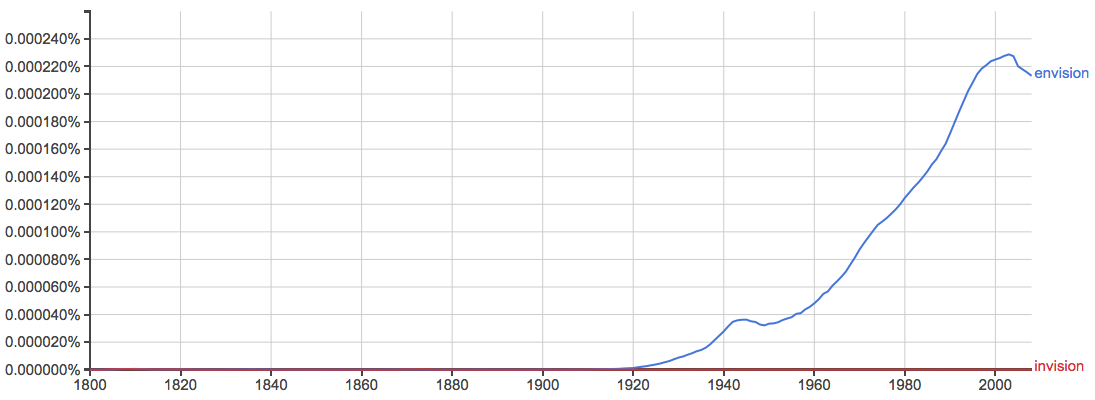As languages evolve, spelling conventions change and some words that used to be correct become mistakes. Most writers no longer spell jail as gaol, for instance, even though this spelling used to be predominant.
The word envision is the same way. A long time ago, it could be spelled as either envision or invision. As English evolved, though, one form dropped out of common usage, and the other became standard.
You aren’t alone if you aren’t sure which is which—many writers don’t know whether invision or envision is the correct spelling of this word. Continue reading to learn more about these spelling differences.
What is the Difference Between Invision and Envision?
In this post, I will compare invision vs. envision. I will outline the correct, modern spelling so that you won’t make this mistake in your future writing.
I will also include a mnemonic device that you can use to help yourself decide how to spell this tricky verb.
When to Use Envision
 What does envision mean? Envision is a verb. It means to visualize or imagine something.
What does envision mean? Envision is a verb. It means to visualize or imagine something.
A philosopher might envision a world without suffering, for instance, or a developer might envision a subdivision where farmland once stood.
For example,
- “I envision myself as a wealthy noble, far from the trappings of this hard life,” said the peasant boy.
- Middle management envisions a sales floor without department leads, but they overestimate the initiative of our sales associates.
- Now try to envision the ways that this set, which ominously includes an upstairs and an elevator, might be violently dismembered by a cast of really bad, really clumsy actors. –The New York Times
Envision remains so spelled in most present tense forms, and is conjugated according to the rules of regular verbs.
Here is a quick breakdown of some of the conjugations of envision,
- I/We envision: first person present
- You envision: second person present
- He/She envisions: third person singular present
- They envision: third person plural present
- I envisioned: simple past
- Envisioning: present participle
When to Use Invision
What does invision mean? Invision is a misspelling of the same word. Some sources cite invision as an outdated spelling, as it has not been widely used in over 200 years. At the infancy of this word, invision saw some play in general usage, but envision has been the predominate spelling for all of history.
Here is a chart that shows the usage of envision vs. invision in English since 1800,

As you can see, almost no one has used invision in quite some time. The chart is no exhaustively accurate, but it still clearly illustrates a long-term trend.
InVision is also the name of a software company based in Portland, OR, USA. In this usage, it is a proper noun. As such, the I and V are always capitalized.
Trick to Remember the Difference
 Envision is the only proper spelling of the noun that means to imagine or visualize. It’s not clear whether invision ever the standard spelling, but it is certainly clear that it is not the standard spelling today.
Envision is the only proper spelling of the noun that means to imagine or visualize. It’s not clear whether invision ever the standard spelling, but it is certainly clear that it is not the standard spelling today.
To remind yourself that envision is the proper spelling of this verb, remember that verb does not contain the letter I, and invision begins with that letter.
Summary
Is it envision or invision? Envision is a verb that means to visualize or imagine something. Invision is a misspelling of that verb, but InVision is a proper noun that refers to an American software company.
To summarize,
- Envision is the proper spelling of this verb.
- Invision is a misspelling.
Contents
